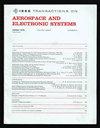基于时间卷积注意网络的截获雷达脉冲流去交织
IF 5.7
2区 计算机科学
Q1 ENGINEERING, AEROSPACE
IEEE Transactions on Aerospace and Electronic Systems
Pub Date : 2025-03-27
DOI:10.1109/TAES.2025.3555244
引用次数: 0
摘要
在电子战领域,雷达信号去交织作为电子侦察的基础和不可缺少的阶段而出现。随着电磁环境日益复杂,再加上多功能雷达(MFRs)等技术的进步,使得传统的去交错技术变得越来越不足。为了解决这些挑战,本文引入了时间卷积注意网络(TCAN)框架。该框架将TCN与先进的注意机制和谐地结合在一起,从而显著提高了系统的信号分选能力。通过严格的实验验证,我们证明TCAN始终优于现有的基线方法。这种优势在信号稀疏和非理想环境下尤其明显,这些环境的典型特征是脉冲损耗、伪脉冲和测量误差。此外,我们进行了深入的分析,以阐明各种输入格式和多参数特征对去交错性能的深刻影响。通过仔细检查这些因素,我们将TCAN建立为一种强大而通用的解决方案,能够有效地导航现代雷达信号环境的高度复杂性。我们的研究结果强调了TCAN作为在不断变化的电磁挑战中增强电子侦察能力的有力工具的潜力。本文章由计算机程序翻译,如有差异,请以英文原文为准。
Deinterleaving of Intercepted Radar Pulse Streams via Temporal Convolutional Attention Network
In the domain of electronic warfare, radar signal deinterleaving emerges as the foundational and indispensable phase of electronic reconnaissance. The ever-increasing complexity of electromagnetic environments, further compounded by technological advancements, such as multifunction radars (MFRs), has led to the inadequacy of traditional deinterleaving techniques. To tackle these challenges, this article introduces the temporal convolutional attention network (TCAN) framework. This framework harmoniously combines a TCN with an advanced attention mechanism, thereby significantly enhancing the system's signal sorting proficiency. Through rigorous experimental validation, we demonstrate that TCAN consistently outperforms existing baseline methods. This superiority is particularly pronounced under conditions of signal sparsity and in nonideal environments, which are typified by pulse loss, spurious pulses, and measurement errors. Furthermore, we conduct a thorough analysis to elucidate the profound impact of various input formats and multiparameter features on deinterleaving performance. By meticulously examining these factors, we establish TCAN as a robust and versatile solution capable of effectively navigating the heightened complexity of modern radar signal environments. Our findings highlight TCAN's potential as a potent instrument for augmenting electronic reconnaissance capabilities amidst evolving electromagnetic challenges.
求助全文
通过发布文献求助,成功后即可免费获取论文全文。
去求助
来源期刊
CiteScore
7.80
自引率
13.60%
发文量
433
审稿时长
8.7 months
期刊介绍:
IEEE Transactions on Aerospace and Electronic Systems focuses on the organization, design, development, integration, and operation of complex systems for space, air, ocean, or ground environment. These systems include, but are not limited to, navigation, avionics, spacecraft, aerospace power, radar, sonar, telemetry, defense, transportation, automated testing, and command and control.

 求助内容:
求助内容: 应助结果提醒方式:
应助结果提醒方式:


